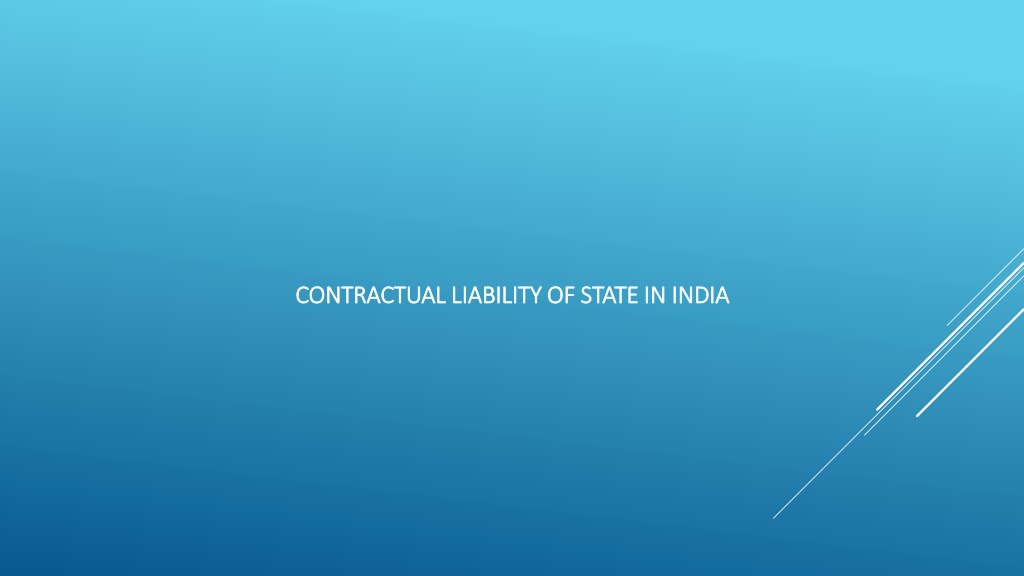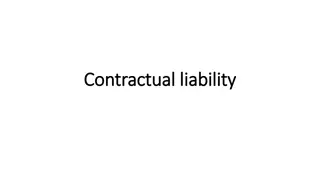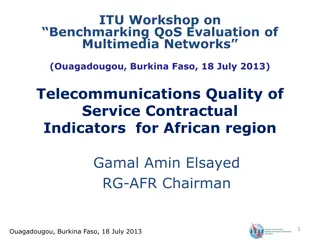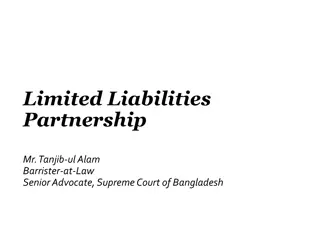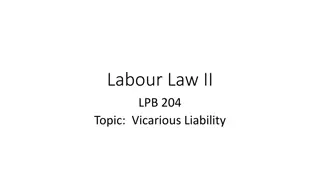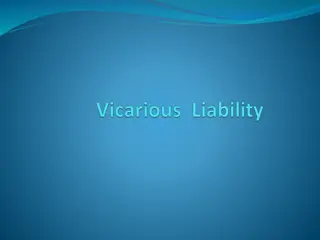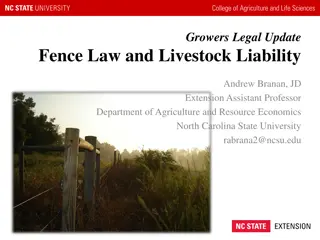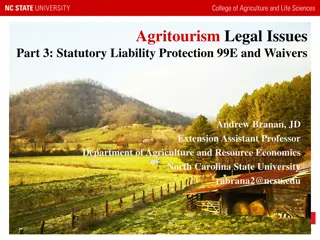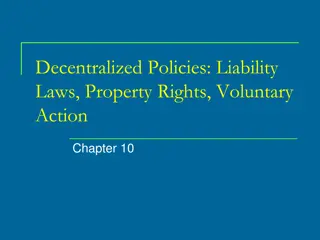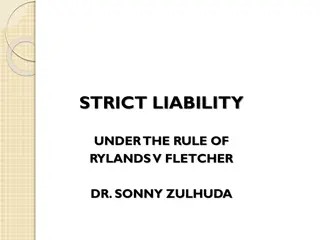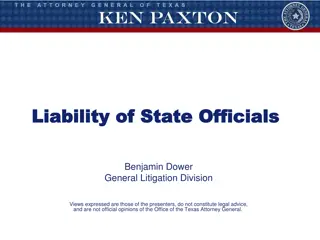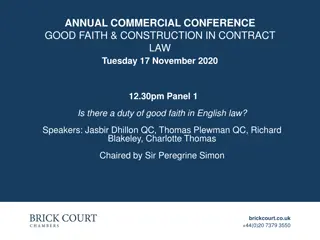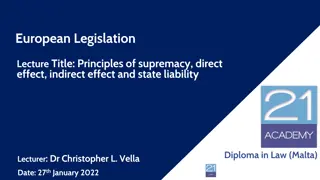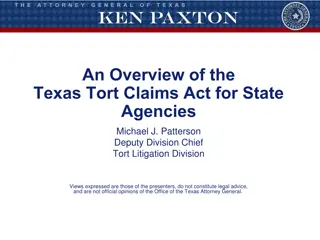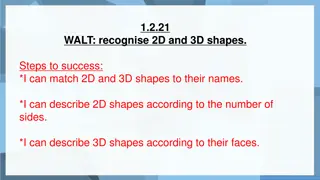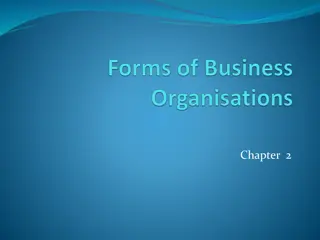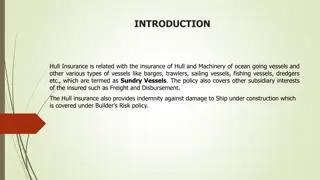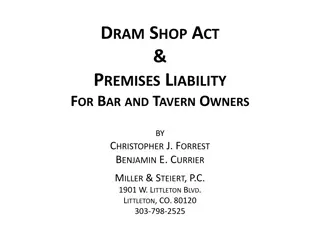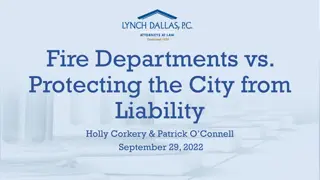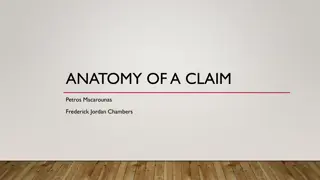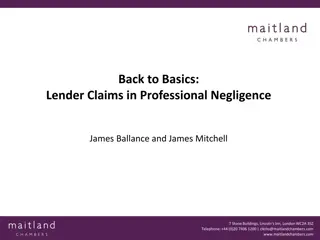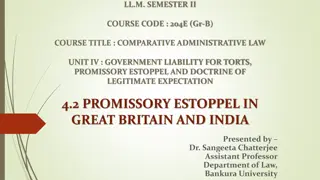Contractual Liability of State in India - Recognition and Application
The liability of the Indian government for breach of contract has been acknowledged since before the inception of the Constitution. Various Acts, such as the Government of India Acts of 1833, 1858, 1915, and 1935, have recognized this liability. Article 299(1) lays down specific formalities for government contracts to be binding, including requirements for execution, authorization, and expression in the name of the President or Governor. Legal cases have also clarified the application of these provisions.
Download Presentation

Please find below an Image/Link to download the presentation.
The content on the website is provided AS IS for your information and personal use only. It may not be sold, licensed, or shared on other websites without obtaining consent from the author. Download presentation by click this link. If you encounter any issues during the download, it is possible that the publisher has removed the file from their server.
E N D
Presentation Transcript
CONTRACTUAL CONTRACTUAL LIABILITY LIABILITY OF OF STATE STATE IN IN INDIA INDIA
The liability of the Government for the breach of contract was recognized even before the commencement of this Constitution. When the East India Company was established mainly for the purpose of commercial activities in India it was said that the fact that East India Company exercised the sovereign functions it cannot be said that they could be immune from being sued in its own courts to the Company. The liability of the Government had been recognized in the number of statutes also. Thus, the provisions were made in the Government of India Acts of 1833, 1858, 1915 and 1935. In P. & O. Steam Navigation Co. V Secy. Of State- it was held by the Supreme Court that no action would lie against the state where the contract was entered into in exercise of sovereign functions of the state. The Calcutta High Court observed and followed the decision of this case in Nobin v. Secy. Of State where it was held by the High Court that the Government was not liable for refusing to grant a licence to the plaintiff for the sale of ganja as the sale of ganja was related to sovereign function. But the Nobin v Secy Of State s decision was refused on the ground that P.& O. Case was a case of torts and no question of contractual liability was involved. However the Government of India Act (1915 and 1935) empowered the Government to enter into contracts with private individuals and the corresponding provision in the Constitution is Article 299(1).
Article 299(1) - prescribed certain formalities for contracts in order to be binding upon the Government. It provided that the person would not be liable if he would make contracts on behalf of the Government. It also provided for the mode and the manner of execution of such contracts which says that This Article also laid down certain requirements which must be fulfilled by the Union or the State:- All such contracts must be made by the President or the Governor; All such contracts to be executed by such persons to whom the President or the Governor may direct or authorize and All such contracts which were made in the exercise of the executive power are to be executed on behalf of the President or the Governor. This Article 299(1) also provided that the contract has to be in writing in order to be valid and if there is an oral contract the same cannot be binding on the Government. i. ii. iii. 1. In Chaturbhuj Vithaldas v Moreshwar Parashram- it was held by the Supreme Court that the Government officers cannot enter into contracts orally or through correspondence. This does not mean that there must be a formal agreement properly signed by a duly authorized officer of the Government. The words expressed and executed have not been literally and technically construed.
2. Contract must be entered into or executed by a person authorized by the President or the Governor as the case may be. - this article does not prescribe for any mode of authorization so the normal procedure to be considered as proper authorization which is to be followed i.e. by notification in the official capacity. 3. It provided that the contract must be expressed to be made in the name of the President or the Governor and if the contract was made by the officer authorized by the Government but was not made on behalf of the President or the Governor then the contract cannot be enforced against them. In Davecos Garments Factory v State of Rajasthan1- it was held that the requirements of article 299(1) have been complied with. Here in this case contract was signed by the Inspector General of Police (IG) for the supply of police uniforms but he did not signed on behalf of the Governor. But the Court held that competent authority signed in his official capacity so requirements have been complied with.
objectives of Article 299 To safeguard the interests of the Government. To protect the Government against the unauthorized contracts. i. ii. The provisions of Article 299(1) are mandatory and not directory and they must be complied with. The provisions had been inserted not merely for the sake of form but also to safeguard the Government against the unauthorized contracts and if the contract is unauthorized or in excess of authority then the Government must be protected. If the contract is not in compliance with the condition then it is not a contract. It was held by the Supreme Court in Union of India v A.L Rallia Ram - that no formal document need to be executed although the word Expressed suggest that government contract must be in particular form. Further it was observed that if the provisions of article 299(1) are complied with then the contract is valid and it can be enforced by or against the Government and the same is binding on the parties. However there are certain exceptions to the rule that a contract in contravention of Article 299 is void. There are certain provisions of Contract Act which provides for some relief to either party even where the contract is void. Invalidity of a contract for contravention of Article 299(1) cannot be set up to nullify the provisions of statutes relating to collateral matters. The private party may be estopped from questioning the validity of the conditions imposed by an invalid contract, when he has obtained benefit under it. i. ii. iii.
Article 299(2)-it provided that Government could not be held liable under Article 299.In other words it can be said that neither the President nor the Governor shall be held personally liable in respect of the contract executed for the purpose of the Constitution or the purpose of any enactment relating to the Government of India. It also provided personal immunity to the person if he makes contract on behalf of the President or the Governor. Earlier when the conditions of Article 299(1) was not complied with suit could not be filed against the Government as the contract was not enforceable but now the Government can accept the liability by ratifying it. But the Supreme Court in Mulamchand v State of M.P held that there is no applicability of doctrine of ratification. It further said that if contract was not in accordance with the constitutional provisions, there was no contract at all and the question of ratification did not arise. In Ramana Dayaram Shetty v International Airport Authority of India and Ors- the notice was issued for inviting tenders for putting up and running a second-class restaurant and two snack bars at International Airport at Bombay by the first respondent and the 4th respondent was awarded contract. However, the 1st respondent set aside the requirement of 5 years experience and proceeded with the 4th respondent. The appeal was rejected by the High Court and the issue raised was whether the state was entitled to deal with its property in any manner it liked or award a contract to any person it chose, without any constitutional limitations upon it. It was held by the court that when 1st respondent entertained tender of 4th respondent despite their inexperience, then, others were denied equality of opportunity. Thus, the acceptance of tender of 4th respondent was invalid as being violative of equality clause of Constitution as also of rule of administrative law inhibiting arbitrary action. In this case the following principles emerge: - Government does not have open and unrestricted choice in the matter of awarding contracts. Government to exercise its discretion in conformity with some reasonable and non- discriminatory standards or principles Government is bound by standards laid down by it. Government can depart from these standards only when it is not arbitrary to do so and the departure is based on some valid principle which in itself is not irrational, unreasonable or discriminatory. i. ii. iii. iv.
Article 300- it provides that the Government may sue or be sued by the name of the Union of India or the Government of a State subject to any provisions made by Act of Parliament or of the State Legislature enacted by virtue of powers conferred by this Constitution, sue or be sued in relation to their respective affairs in the like cases as the Dominion of India and the corresponding Provinces or the corresponding Indian States might have sued or been sued if this Constitution had not been enacted. Article 294- provides for the succession to property, assets, rights, liabilities and obligations to the present Government of the Union and the State. Article 298- says that Government can enter into contract for the purpose of carrying out the functions of the State. Article 299- it deals with the certain essential formalities which the Government must fulfil while entering into a contract. Article 300- speaks about the manner in which the suits and proceedings be instituted by the government.
The contract entered into by the Government cannot be complete unless the Government besides satisfying the requirements of the Article 299 of the Constitution also fulfils the requirements of the section 10 of the Contract Act, 1872 dealing with the essentials of the valid contract. Section 73, 74 and 75 of the Contract Act, 1872 is also applicable while dealing with the government contracts. However, the Indian Contract Act, 1872 did not provide for any specific form for entering into a contract. It says that contract may be expressed or implied which can be inferred from the circumstances of the case and from the conduct of the parties. The contract may be oral or in writing. The position is however different with regard to the Government Contracts. It was held by the Supreme Court in State of Bihar v Majeed- that the Government Contracts are also governed by the provisions of the Indian Contract Act, 1872 like any other contract. In addition to that Government Contracts has also to fulfil the requirements of Article 299 of the Constitution. The contractual liability of the Government will be the same as that of any other individual. Article 300 of the Constitution also points out that the extent of liability of the Union of India will be same as that of Dominion of India and the provinces under the Government of India Act, 1935. The Act of 1935 refers to Act of 1915 which further refers to Government of India Act, 1858 that means in order to determine the extent of liability of today East India Company must also be referred to. Before 1947 the Crown in U.K enjoyed immunity from being sued in its own courts but this immunity does not extend to East India Company. Government of India Acts 1858, 1919 and 1935 also provides for the manner in which government contracts must be made.
Reasonableness, fairness This principle is an essential element of equality and non- arbitrariness which has been laid down in Article 14 of the Constitution. It must characterize every state action whether under the authority of law or in exercise of executive power without making of law. It further provides that state must not act arbitrarily while entering into contractual relationship with the third parties and it must conform to rational or non- discriminatory norms. Fairness- this requirement further implies that even administrative authority must act in good faith and without bias. It is a settled principle of law which says that the Court would strike down an administrative action which violates any foregoing provisions. This doctrine of fairness was established in administrative law to ensure Rule of Law and to prevent failure of justice. Public Interest This concept of public interest is of prime importance. There are circumstances which necessitate us to depart from public interest rule but those circumstances must be fair and rational. Every public authority is required to act in the public interest. Nothing should be done which shows biasness from their side. They must exercise their power in public interest and in public good. Equality and non- arbitrariness According to positivist equality is antithesis to arbitrariness. When an act is arbitrary it is implicit that it is unequal and violative of Article 14. The principle of reasonableness which is an essential element of equality and non- arbitrariness pervades Article 14 and its procedure is laid down in Article 21.
State is as much liable as an individual is liable to enter into a contract. But the State cannot act arbitrarily in entering into a contractual relationship. So when the State enters into a contract it has to comply with certain formalities which have been enumerated in Article 299 of the Constitution of India All the requirements under Article 299 are mandatory but if the State fails to comply with the provisions of Article 299 of the Constitution of India the contract will be null and void. The provisions of article 299(1) have been enacted for the purpose of safeguarding the interests of the State against the unauthorized contracts and if the contract is unauthorized or in excess of authority then the Government must be protected. If the contract is not in compliance with the condition then it is not a contract. Earlier when the conditions of Article 299(1) was not complied with suit could not be filed against the Government as the contract was not enforceable
